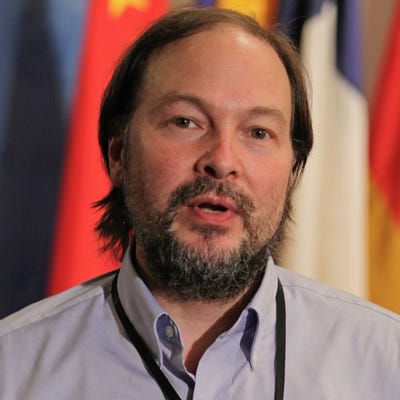An Insider's View of the T-Mobile/Sprint Trial
For ten days in New York City, lawyers waged a final, all-out battle around the proposed merger of Sprint and T-Mobile. A veteran court journalist was there for the whole thing. Here's what he saw.

Editor's Note: Matthew R. Lee is a veteran journalist who closely covers the US District Court for the Southern District of New York and other federal and state courts. He covered the entirety of the ongoing Sprint and T-Mobile antitrust merger trial.
For ten days in December, the attorneys general of states, including New York and California, tried to convince US District Judge Victor Marrero to stop the proposed T-Mobile/Sprint merger. Put on the witness stand were executives ranging from T-Mobile's John Legere and Mike Sievert to Dish Network's Charlie Ergen, alongside a half-dozen antitrust experts.
Legere ditched his standard T-Mobile-branded T-shirt for a jacket and magenta tie. He came off as energetic, explicitly playing the "maverick" card and pushing back at cross-examination questions by refusing to answer "yes" or "no."
Judge Marrero waited until after Legere's cross-examination to ask his own question. He mused about long-ago "flower children" becoming investment bankers, seeming to equate Legere with 1960s-era hippies, now grown up. He asked Legere if he and T-Mobile might follow that trajectory and eventually become industry insiders -- one of the boys, next to executives from AT&T and Verizon. Legere said "never." But under Mike Sievert -- who is in line to take over the CEO spot from Legere next year -- that seems a little more likely.
Judge Marrero's question seemed to reflect the conflation of the personal style of CEOs with the actual competitive strategies of publicly traded corporations. Legere might be offering no-contract smartphones and free Netflix binging, but that's not necessarily being a hippie.
The same applied to Charlie Ergen's time on the stand. Ergen made a point of saying that his people "better be working" while he was in the courthouse. The implication seemed to be that he and Dish Network will do whatever is necessary to build up the MVNO agreement and 9 million Boost-branded prepaid customers who would be divested to them as part of a Sprint and T-Mobile merger. But there was continued sniping during Ergen's cross-examination about Dish's prior broken promises and delayed performance in relation to its vast spectrum holdings.
Throughout the ten days of trial, courtroom 23A -- with its side view of midtown Manhattan -- was packed. Nearly all were in suits, but in the back rows there were also people in denim who worked with Sprint's Boost Mobile prepaid brand and other retail brands. There was an overflow courtroom on the 15th floor, in front of which huge lunch spreads were laid out. The whole event gave off a distinct country club feel -- a vibe exacerbated when family members of defendants for narcotics and firearms conspiracies passed by.
And for one morning during the trial things got even more exclusive, when Judge Marrero heard evidence behind closed doors because it was too commercially sensitive to be aired in public. Dish Network's DC-based lawyers from Steptoe & Johnson LLP told Judge Marrero that "Mr. Ergen intends to testify about two topics involving especially sensitive material -- Dish's financial model for its consumer wireless service, and its negotiations for potential strategic partners."
Indeed, a letter that was unsealed just yesterday said that Dish has "already conducted high-level discussions with various companies who have expressed interest in partnering with Dish on various aspects of its 5G consumer wireless service. The identity of these potential partners and the substance of such discussions are highly confidential." The letter did not provide any more details on the topic.
Among those who see the proposed merger as anti-competitive, there was a frustration with the states' approach of playing "gotcha" with old emails, putting into evidence internal communications at the companies after the merger proposal was announced rather than filling the record with data. Their expert who testified during the trial -- Professor Carl Shapiro, an economics professor at the University of California at Berkeley -- did hammer home the point that a combination of the wireless industry's third and fourth biggest providers could reduce competition in local markets, but there was disagreement as to whether the local-market argument could be applied nationally.
A betting man, having observed the trial, might predict that Judge Marrero will deny the states' request to block the merger, thereby letting it go forward, sometime after he hears final oral arguments next month.
But when a multi-billion dollar merger comes down to a single individual's opinion, one never knows. The next steps in the case will include 30-page submissions of proposed findings of fact and law by Jan. 8, and final oral arguments, two hours each side, on Jan. 15.
Then Judge Marrero will rule.
— Matthew Russell Lee, special to Light Reading. Follow him @innercitypress and on Patreon
About the Author(s)
You May Also Like












